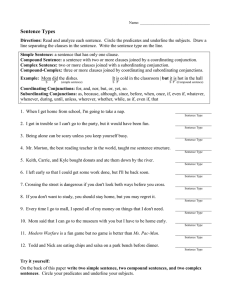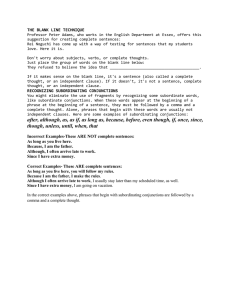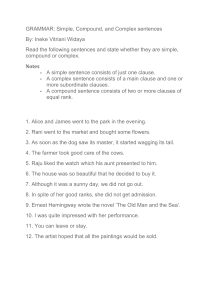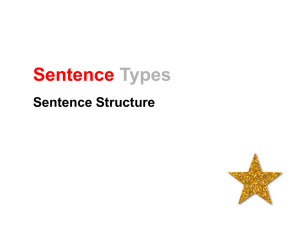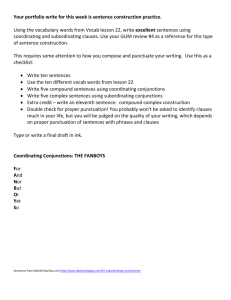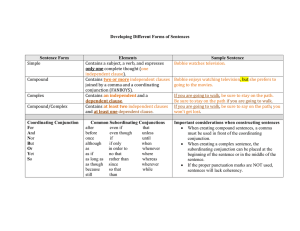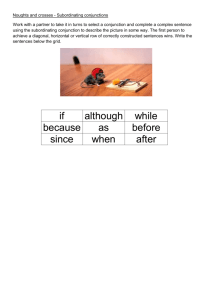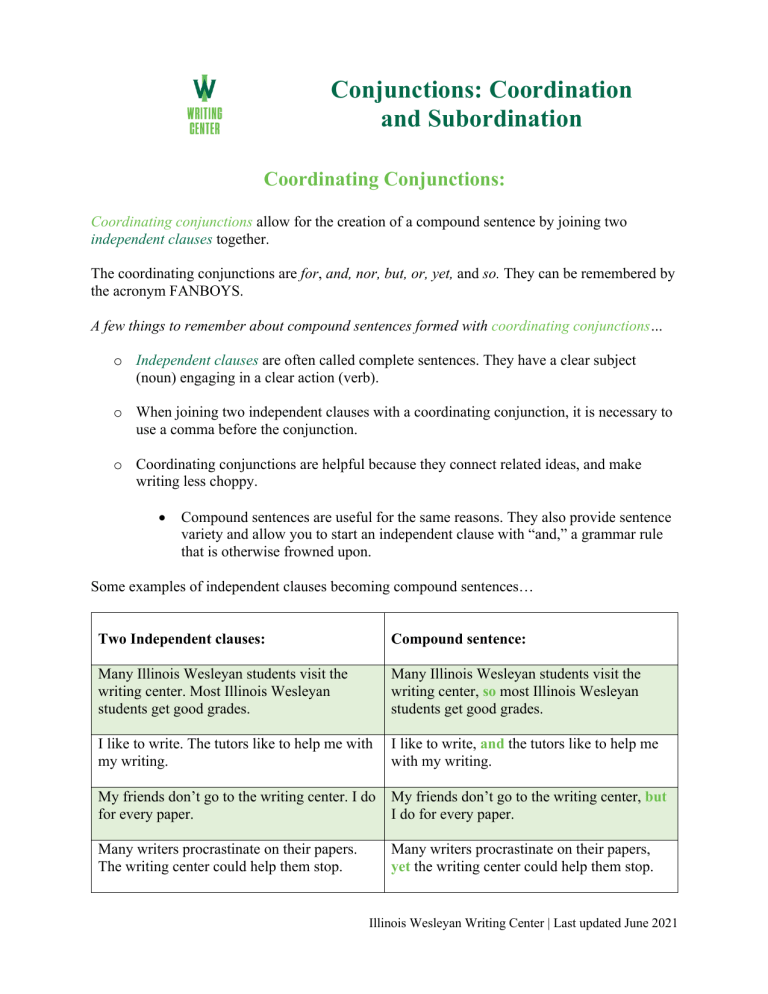
Conjunctions: Coordination and Subordination Coordinating Conjunctions: Coordinating conjunctions allow for the creation of a compound sentence by joining two independent clauses together. The coordinating conjunctions are for, and, nor, but, or, yet, and so. They can be remembered by the acronym FANBOYS. A few things to remember about compound sentences formed with coordinating conjunctions… o Independent clauses are often called complete sentences. They have a clear subject (noun) engaging in a clear action (verb). o When joining two independent clauses with a coordinating conjunction, it is necessary to use a comma before the conjunction. o Coordinating conjunctions are helpful because they connect related ideas, and make writing less choppy. • Compound sentences are useful for the same reasons. They also provide sentence variety and allow you to start an independent clause with “and,” a grammar rule that is otherwise frowned upon. Some examples of independent clauses becoming compound sentences… Two Independent clauses: Compound sentence: Many Illinois Wesleyan students visit the writing center. Most Illinois Wesleyan students get good grades. Many Illinois Wesleyan students visit the writing center, so most Illinois Wesleyan students get good grades. I like to write. The tutors like to help me with my writing. I like to write, and the tutors like to help me with my writing. My friends don’t go to the writing center. I do for every paper. My friends don’t go to the writing center, but I do for every paper. Many writers procrastinate on their papers. The writing center could help them stop. Many writers procrastinate on their papers, yet the writing center could help them stop. Illinois Wesleyan Writing Center | Last updated June 2021 Subordinating Conjunctions: Subordinating conjunctions have two functions (repeat this rhyme to yourself to remember it!) Firstly, they are used to subordinate one independent clause to another—making it dependent. Secondly, a subordinating conjunction links an independent and dependent clauses together. Since a complex sentence is composed of an independent clause and a dependent clause, subordinating conjunctions are crucial in writing complex sentences. The subordinating conjunctions are after, although, as, as if, because, before, even if, even though, if, if only, rather than, since, that, though, unless, until, when, where, whereas, wherever, whether, which, and while. A few things to remember about complex sentences with subordinating conjunctions… o A dependent clause is a clause that cannot stand alone. It must be connected to an independent clause. • The dependent clause can be placed either before or after the independent clause, but when placed first a comma must be added after the dependent clause. o Complex sentences are useful for providing extra detail to an independent clause while also providing sentence variety. No one wants to read a paper with only complex sentences just as no one wants to read a paper with only compound ones! Some examples of independent clauses becoming complex sentences… Two Independent clauses: Complex Sentence: Many Illinois Wesleyan students visit the writing center. Most Illinois Wesleyan students get good grades. Because many Illinois Wesleyan students visit the writing center, most Illinois Wesleyan students get good grades. I like to write. The tutors like to help me with my writing. The tutors like to help me with my writing since I like to write. My friends don’t go to the writing center. I do for every paper. Although my friends don’t go to the writing center, I do for every paper. Many writers procrastinate on their papers. The writing center could help them stop. Many writers procrastinate on their papers, even if the writing center could help them stop. Note that the underlined segments above can no longer stand alone. The addition of the subordinating conjunctions “because,” “since,” “although,” and “even if” have turned them into a dependent clause and these clauses now only make sense within the context of the independent clause. Illinois Wesleyan Writing Center | Last updated June 2021

